Caching makes any WordPress site load super quick instantly. And the fastest WordPress cache plugin can give your site the biggest speed boost as it solves one of the biggest speed issues of WordPress that is dynamic content.
Among all the caching plugins tested in this article, LiteSpeed Cache proved to be the best WordPress caching plugin for the fastest loading speed. Its superior server level caching and other speed optimization features ensure the best level of optimization for the websites.
Besides caching, most caching plugins offer other optimization features like HTML minification, CSS and JS minification and combination, and so on. However, caching and these optimization features are two fundamentally different things. And so they need to be measured differently. This way it will be possible to identify the performance of individual plugins in terms of caching and other optimization features separately.
An argument can be made that those optimization features can also be considered as caching in the sense that these plugins temporarily save their optimized files for efficient delivery of them in the future. And that process of saving files for efficient future delivery falls into the definition of caching. Regardless, measuring the performance of caching and other optimization features separately will be more reasonable.
However, I haven’t considered image optimization and database optimization for this testing because they aren’t offered by most caching plugins. So, when testing the plugins, I have disabled these features if they were found in the plugins options.
What Is Caching?
Caching is the process of temporarily storing copies of different files for faster delivery of those files in the future. In case of WordPress, caching means storing a static snapshot of dynamic files. Dynamic files are those that need to be recreated every time they are needed. Conversely, static files are those that don’t need to be recreated every time they are needed instead the same file is used whenever they are needed.
HTML files are an example of such dynamic files in WordPress. Every time a webpage is visited in WordPress, that page, aka the HTML file, is dynamically created by running PHP scripts, making database queries, and then compiling them. So, this page creation process takes some time to complete. That’s why if a copy of that dynamically created page is stored and then served to the next visitors, then it will be a faster and more efficient solution. This storing of the static copy of webpages is called full page caching.
Even though there are many types of caching, here I am using caching to mostly mean full page caching. The effect of full page caching can be most accurately measured by server response time. That’s why, in this article, I have used server response time as the testing criteria for caching performance.
Take a look at this article to know more details about caching and its types.
What Does a Caching Plugin Do?
As described in the earlier section, caching is used for faster and efficient delivery of the webpages. But the process of caching WordPress sites is very complicated. It requires a delicate setup that can accurately determine when a file needs to be cached, when the cached files need to be removed, when the cached files get affected by the changes in something else, and so on. And any error in accurately measuring these things can break a site or result in unwanted behavior.
Caching plugins make the process of storing static snapshots of dynamic files super easy. These plugins decide which files to cache, when to cache, how long to keep the cached files, when to regenerate the cached files, and so on. And all of these are done behind the scene. So the caching plugins give a seamless caching experience to your WordPress website without needing you to worry about the difficulties behind it.
Do I Need a Caching Plugin?
In short, if you want to increase your WordPress website speed and utilize your web server resources, then you need a caching plugin.
Caching plugins heavily reduce the time consuming and resource intensive task of dynamic page creation. And by doing so, they improve your website speed and saves your server resources.
Additionally, as your website gets older, it becomes bulky with lots of files and its database size starts to grow. So, your website no longer remains competent enough to serve the same number of visitors as it served before for the same server resources. To deal with this problem you can use caching plugins that will enable your site to run faster and handle more visitors for less server resources.
Testing Environment
Here, I have tried to make a testing environment that can give consistent performance throughout the testing period. So that the result of the comparison can be reasonably dependable.
That’s why I have used a VPS (from a cloud hosting provider) with little to no outside traffic. This way I tried to eliminate outside interference as much as possible.
Server Configuration
Hosting provider: Amazon Web Services
Hosting type: Cloud Hosting (VPS)
CPU: 1 vCPU
RAM: 1 GB
Server application: OpenLiteSpeed
PHP: 7.4
WordPress Setup
WordPress version: 5.4.2
Theme: Twenty Twenty (default theme)
Page builder: Guttenberg (default page builder)
Tested webpage: Hello world! (default post)
Testing Tool
Website: GTmetrix (using default settings)
Testing Particulars
In this testing, I will only use server response time, total page size and total number of requests as the testing criteria. That’s because caching will affect the server response time while optimization features will affect the total page size and total number of requests. Server response time is the time taken by web servers to make a response to any webpage request by any visitors.
Even though total page load time appears to be the best testing criteria, I won’t consider it in this testing because it is largely affected by variable network latency, DNS resolution time and many other things. You can tell this by the fact that when you do multiple testing of the same webpage, the total page load time fluctuates largely even though you don’t change anything between the testing.
Conversely, when you do multiple testing, server response time varies very slightly whereas total page size and total number of requests almost never change if you don’t change anything between the testing.
That’s why using response time, total page size, and total number of requests, as opposed to total page load time will be more reliable as the testing criteria.
Moreover, additional optimization features like minification, combination, and others don’t affect server response time as long as the HTML page is being cached. That’s because after the files are optimized, they get saved, aka cached. And then their locations, aka URLs, are included in the HTML pages. So, when the HTML pages get cached they already include the URLs of the optimized files. Therefore, optimization features don’t affect the server response time when cached HTML pages are served.
Alternatively, if the HTML pages aren’t cached, then they need to be regenerated whenever they are accessed. So even though the optimized files are already cached, their URLs still need to be included in the HTML pages whenever they are regenerated. And that extra process of including the URLs increases server response time.
Therefore, caching and additional optimization features provided by the plugins won’t interface with each other’s results. So, server response time, total page size and total number of requests will be pretty reliable measurement criteria for measuring the performance of caching and other optimization features separately.
Also, webpages generally get cached after the first visit so the second and onward visits are served from cache. That’s why I have ignored the first test result for all the plugins. Then I ran a few additional tests for each of the plugins and accepted the one that showed the best result. The reason behind this is to find out the best possible performance from the plugins.
For this testing, I updated the settings of every individual plugin to make the settings best suited for the tested webpage. The reason was to get the best result out of the webpage without breaking the page.
How to Use GTmetrix for Measuring Caching Plugins Performance
In order to find out the server response time, total page size, and total number of requests for webpages in GTmetrix, you can follow the below instructions.
First, go to gtmetrix.com, then log in to your account. If you don’t have an account in, then you can create on for free. After that, enter your webpage URL in the input field and then click on “Test your site”
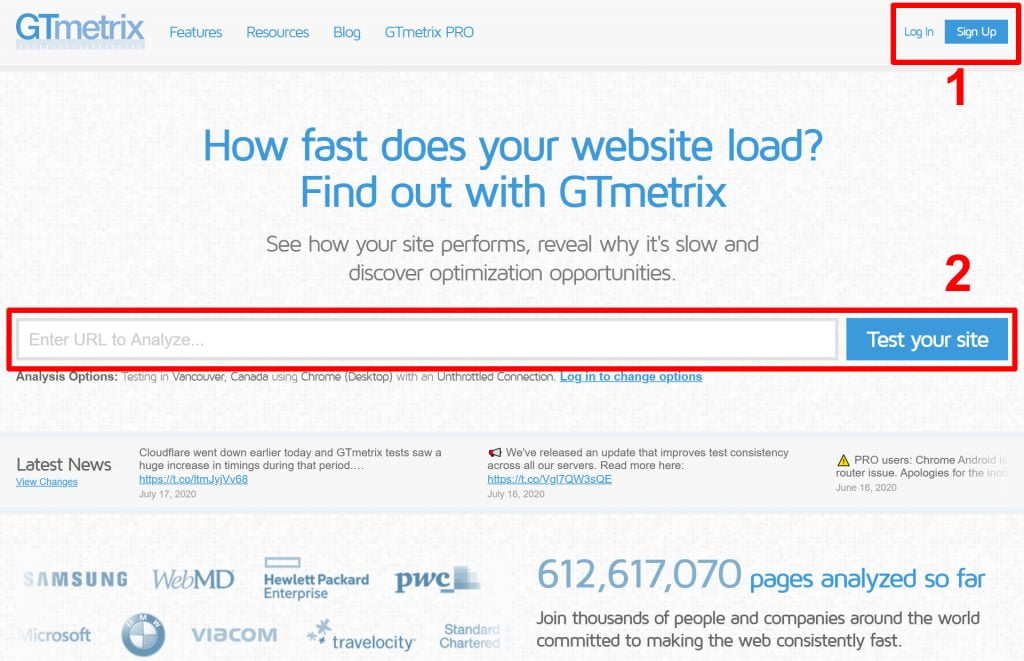
After the test is completed and you are presented with the performance report, you will see the “Total Page Size” and total number of “Requests” in that report.
Then in order to see the server response time, click on the “Timings” tab. It will show you a timing breakdown where you will see the “Backend” time. This backend time is the server response time for your webpage.
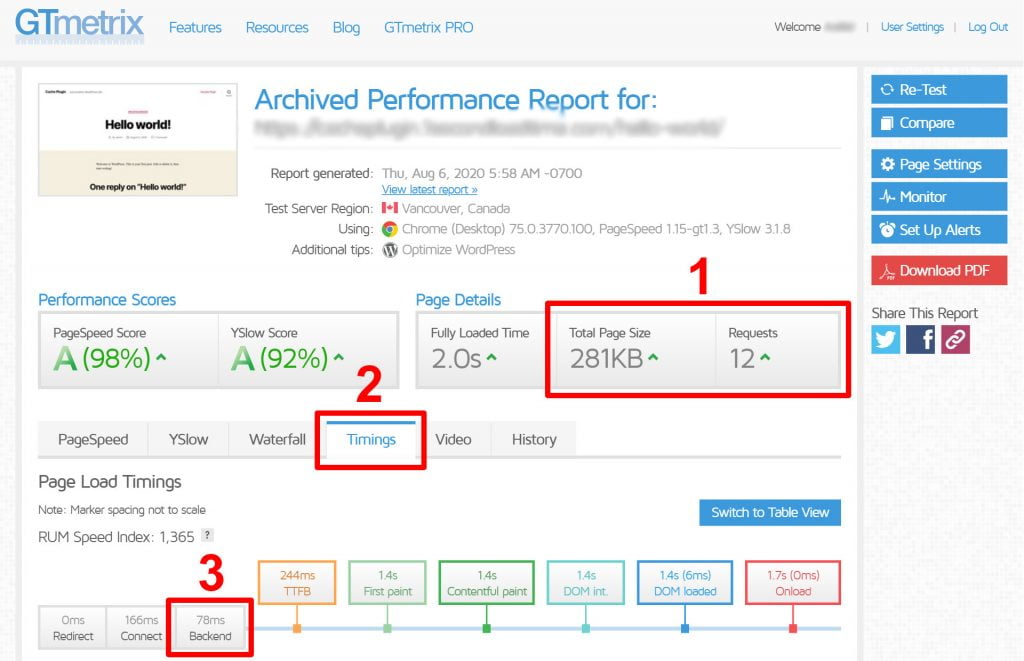
Note that it isn’t required to log in to GTmetrix in order to test your webpage. However, in order to see the results in the Timings tab, you will need to log in before you test your webpage.
There is another way of identifying server response time in GTmetrix report that doesn’t require logging in. For that, you will need to go to the “Waterfall” tab then hover over the timing bar of your webpage’s URL. This will show you a timing breakdown for that URL where you will see the “Waiting” time. This waiting time is the server response time for your webpage and therefore it will be the same as the “Backend” time from the “Timings” tab.
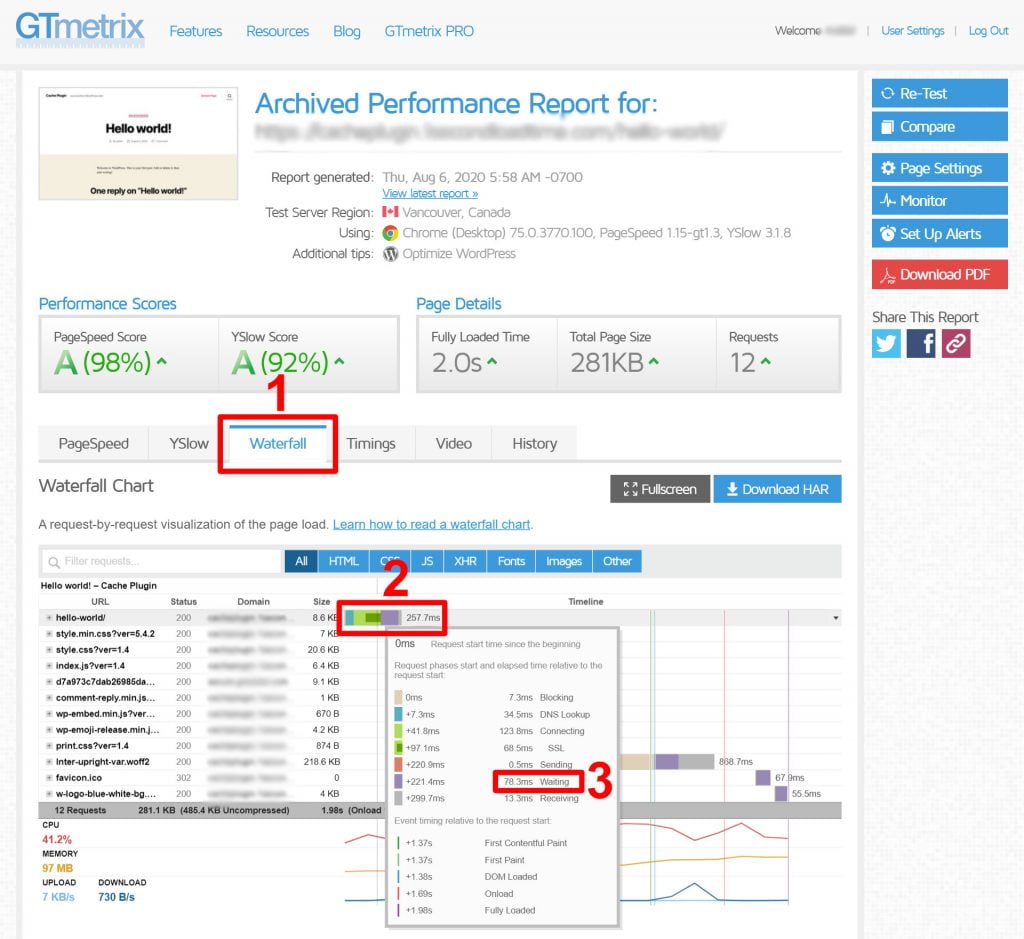
Fastest WordPress Cache Plugin List
In this testing, I have used only the most popular 5 caching plugins. These plugins have pricing models of either free, freemium, or premium. That is to say, I have used only the free version of the freemium plugins in this testing.
All of the free and freemium plugins listed here are actively developed, has been rated at least 4 stars out of 5 stars and has over 1 Million active installations.
The idea behind this testing is to give you a general idea about which plugins give the best performance in terms of providing the fastest load time. But at the same time, this is a much generalized test and so based on your specific website setup, you may find different results. Your website may even look broken or behave unexpectedly while using a particular plugin.
Additionally, changing settings in the individual plugins based on your individual needs may give a better or worse performance for your website. So, you can try a few of these plugins to see which one works best for you. That’s why I have provided with additional description about these plugins in order to help you choose the right one for your individual needs.
Test Result without Any Caching Plugins
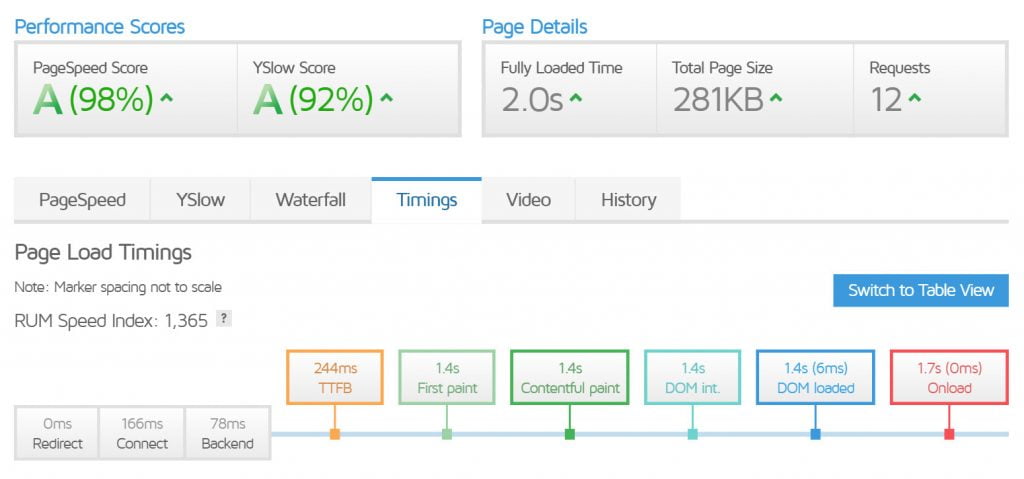
If you just want to see the comparison of the test results, then skip to the comparison table at the end.
LiteSpeed Cache

LiteSpeed Cache is a different kind of caching plugin than the others in this list. It is a server-level caching plugin while the others are application-level caching plugins. Server level means that it can serve cached pages completely from the server without requiring to run any PHP scripts or database queries. So, it doesn’t require loading WordPress at all to serve cached pages.
On the other hand, application level caching plugins eliminate the necessity of making database queries or creating new pages by running PHP but they still need to rely on some PHP to serve cached pages. Therefore, it is a less efficient caching solution than server level caching.
Because of the advantage of server level caching, LiteSpeed Cache generally provides faster server response time than other caching plugins.
However, in order to use the caching feature of LiteSpeed Cache, you will need to use LiteSpeed server, as opposed to Apache, NGINX, or other server applications. But when you are using a LiteSpeed server, LiteSpeed Cache can be the best choice for you.
Besides caching, LiteSpeed Cache provides all kinds of optimizations that are necessary for optimizing WordPress websites for fast loading speed.
LiteSpeed Cache is loaded with lots of customization options which give you extensive control over how caching and other optimization features work on your site. But this also means that you will require a substantial amount of knowledge to fully take advantage of all these features.
How Popular Is LiteSpeed Cache
LiteSpeed Cache has over 1 million active installations on WordPress which makes it one of the most popular caching plugins on the platform. And with all the benefits it offers, no wonder it has been rated over 4.9 out of 5 stars by over 1 thousand people.
Pricing
- Free (requires LiteSpeed server)
Test Result for LiteSpeed Cache
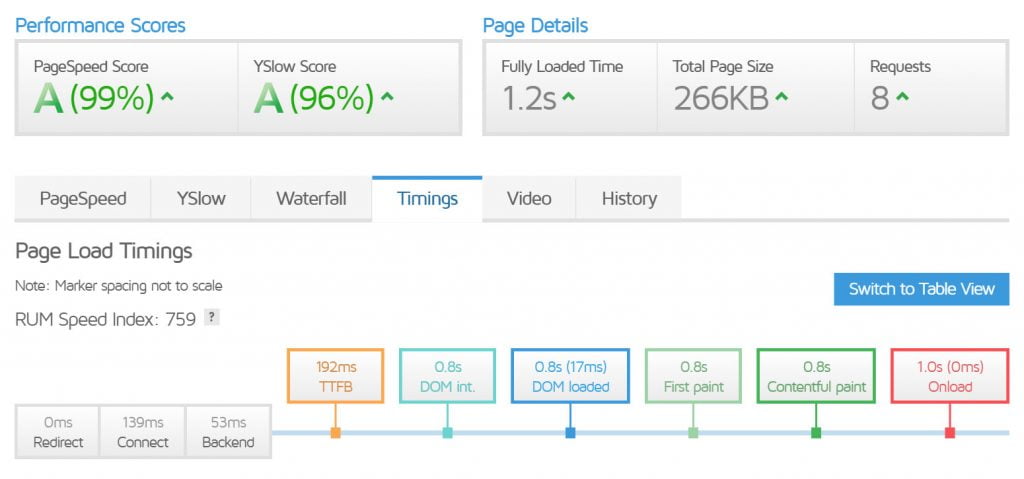
WP Rocket

WP Rocket has one of the simplest user interfaces of all caching plugins. Besides caching, it provides all sorts of optimization features that a website needs for proper speed optimize. Additionally, it manages to work very well with all sorts of websites even without changing any of its default settings. These three things combined make WP Rocket an easy choice for most people.
It is the only plugin in this list that comes with only premium version and no free or freemium versions. But the investment in WP Rocket will make it super easy for you to enable caching and utilize all kinds of optimizations that are necessary for your WordPress site speed.
How Popular Is WP Rocket
According to its website, WP Rocket has over 1 million active installations which make it the most popular premium caching plugin in the market. It has been rated 4.9 out of 5 stars by over 800 people in TrustPilot. And that perfectly tell how much people like using this plugin.
Pricing
- Premium (Starts at $49 for 1 website and 1 year of updates then goes up to $249 for unlimited websites and 1 year of updates)
Test Result for WP Rocket
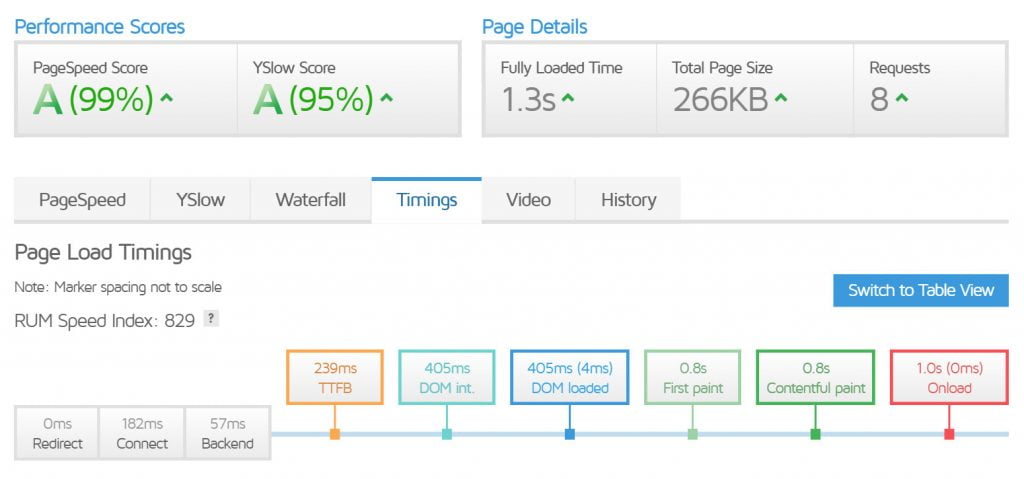
WP Super Cache

WP Super Cache is by the same company that created WordPress. Because of that, it will generally have very high compatibility with all sorts of websites. WordPress doesn’t have a built-in caching system but WP Super Cache can fulfill that gap very easily. In fact, it only provides caching and no other optimizations that many other caching plugins offer.
It has an easy mode that gives you just two options to either turn on or turn off caching. So, it doesn’t require any prior knowledge about the complicated settings involved in caching which makes it very much beginner friendly. But it also has an advanced mode which will give you quite a lot of options for configuring the caching on your site exactly the way you want.
WP Super Cache can be just the right choice if you want a caching plugin without any other built-in optimization features that might just make your site bulky.
How Popular Is WP Super Cache
WP Super Cache has over 2 million active installations on WordPress which makes it the most popular caching plugin on the platform. It has been rated over 4.2 out of 5 stars by over 1 thousand people.
Pricing
- Free
Test Result for WP Super Cache
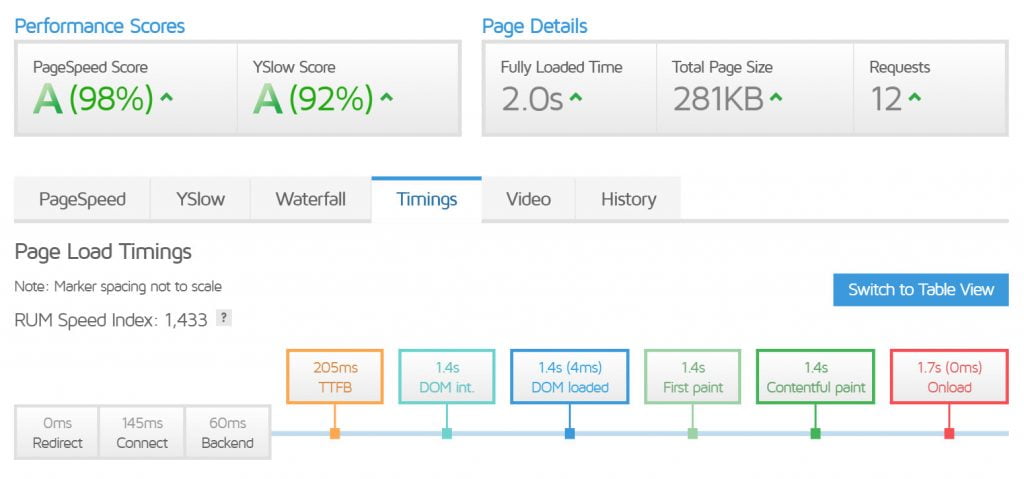
WP Fastest Cache

WP Fastest Cache has one of the simplest user interfaces in all the caching plugins. But this simplicity doesn’t mean that it lacks crucial customization options. In fact, its simplicity coupled with just enough customization options make WP Fastest Cache easily configurable by most beginners who have only a limited amount of knowledge about caching.
Besides caching, WP Fastest Cache offers additional customization features needed for WordPress websites. All its necessary caching configuration options and some of its additional optimization features are included in its free version. But it is required to upgrade to one of its premium plans in order to use all the features offered by the plugin.
When you combine simplistic interface, additional optimization features, minimal customization options, and free plan together, WP Fastest Cache easily becomes a worthy choice for many people.
How Popular Is WP Fastest Cache
WP Fastest Cache has over 1 million active installations on WordPress which makes it one of the most popular caching plugins on the platform. It has been rated over 4.8 out of 5 stars by over 3 thousand people. And such a rating clearly tells how much it is liked by its users.
Pricing
- Freemium (Free version available. Upgrade starts at $49.99 for 1 website and lifetime updates then goes up to $175 for 5 websites and lifetime updates)
Test Result for WP Fastest Cache
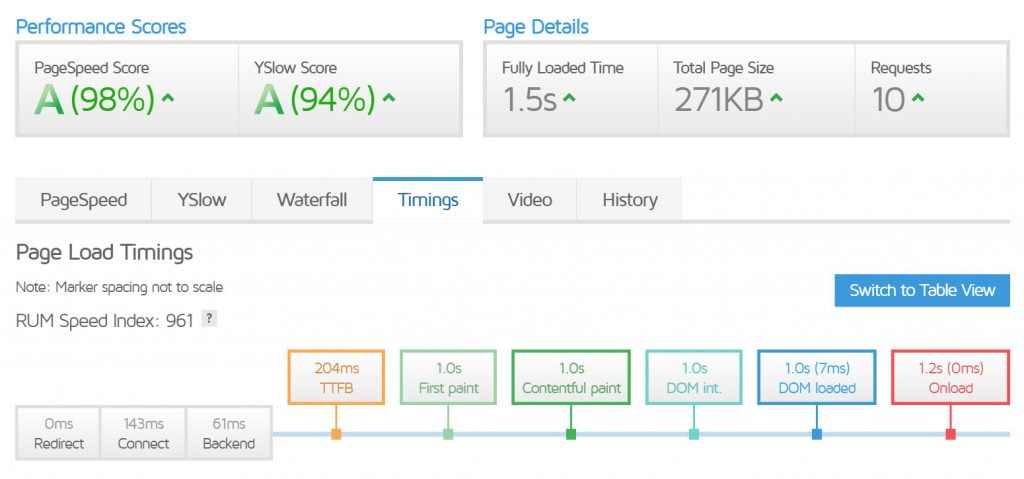
W3 Total Cache

W3 Total Cache is full of customization options that give you extensive control over how caching works on your site. In fact, in addition to general settings, you will find separate settings pages for different kinds of caching. This, however, also means that a large understanding of caching will be necessary for fully taking advantage of these customization features.
W3 Total Cache also comes with some other optimization features like minification, combination, and inlining of CSS and JS files.
This extensive control over its features can make W3 Total Cache a great choice if you want to configure everything exactly the way you want.
How Popular Is W3 Total Cache
W3 Total Cache has over 1 million active installations on WordPress which makes it one of the most popular caching plugins on the platform. It has been rated over 4.3 out of 5 stars by over 4.5 thousand people. These many ratings make it the most rated caching plugin on WordPress.
Pricing
- Freemium (Free version available. Upgrade is $99 for 1 website and 1 year of updates)
Test Result for W3 Total Cache
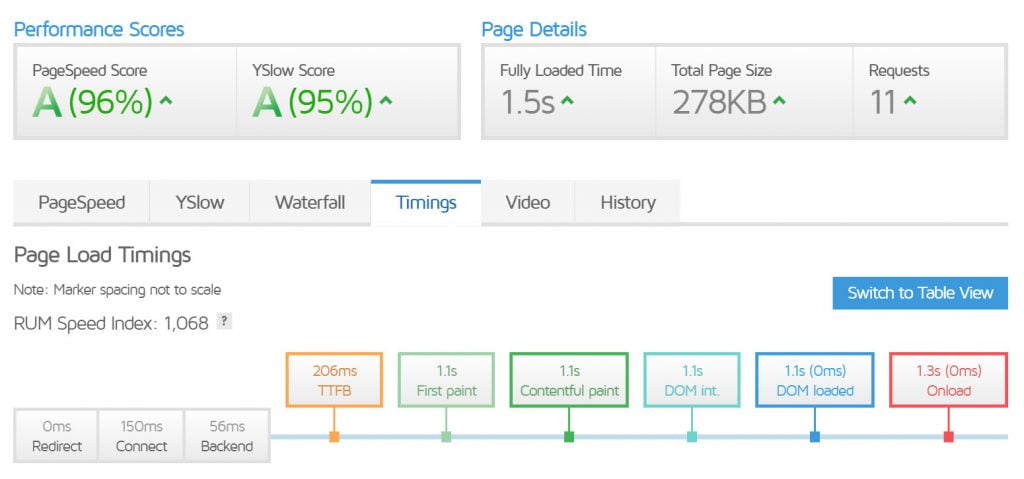
Comparison
| Ranking | Plugin Name | Server Response Time | Total Page Size | Number of Requests |
|---|---|---|---|---|
| N/A | 78ms | 281KB | 12 | |
| 1 | LiteSpeed Cache | 53ms | 266KB | 8 |
| 2 | WP Rocket | 57ms | 266KB | 8 |
| 3 | WP Fastest Cache | 61ms | 271KB | 10 |
| 4 | W3 Total Cache | 56ms | 278KB | 11 |
| 5 | WP Super Cache | 60ms | N/A | N/A |
Based on the performances of all these caching plugins, LiteSpeed Cache gives the fastest server response time so its caching gives the fastest loading speed. Additionally, LiteSpeed Cache and WP Rocket both give the same result for total page size and total number of requests so these two plugins provide the best optimization for WordPress sites.
In short, LiteSpeed cache is the best caching plugin for optimizing your WordPress site. However, you need to use LiteSpeed server in order to use all the features of LiteSpeed Cache. So, if you are on a LiteSpeed server, then LiteSpeed cache can be the best choice for you.
Conversely, if you aren’t on a LiteSpeed server, then WP Rocket can the best plugin for optimizing your site. But it is a premium plugin so if you want a free plugin then you will need to use a different one. In that case, if you want to have extensive control over your caching settings, then you can go with W3 Total Cache. Otherwise, you can go with WP Fastest Cache.